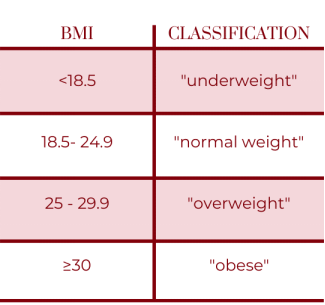Obesity is a global health challenge that impacts people of all walks of life. It's a multifaceted condition that goes beyond a number on the scale, involving a complex interplay of genetics, lifestyle, and environmental factors. In this article, we'll explore the science behind obesity, the significance of Body Mass Index (BMI), the health risks associated with it, and the comprehensive strategies for management.
Understanding BMI:
BMI is a valuable tool for classifying weight relative to height, providing a snapshot of an individual's weight status. It's measured in units of kg/m² and categorized into underweight, normal weight, overweight, and obesity. However, BMI doesn't differentiate between muscle and fat, so it's not a perfect indicator of body fatness or overall health.

https://images.app.goo.gl/uiqNTuAPhWHyRdFi9
The Spectrum of Causes:
Obesity is influenced by a mosaic of factors, including genetic predispositions, metabolic rates, dietary habits, physical activity levels, and psychological components such as stress and emotional eating. Socioeconomic status and cultural practices also contribute to the obesity landscape.

https://images.app.goo.gl/ABZH79GHwoZBUh7v8
Health Risks:
The ramifications of obesity are far-reaching, increasing the risk of numerous health issues like cardiovascular diseases, type 2 diabetes, various cancers, osteoarthritis, and respiratory problems. It also poses psychological challenges, including depression and social stigma.

https://images.app.goo.gl/DAHg5uMqZcwTHDWN8
Holistic Management Strategies:
Effective obesity management is a personalized journey that involves setting achievable goals, embracing a balanced diet, engaging in regular physical activity, and seeking behavioral and medical support when necessary. Bariatric surgery may be an option for those with severe obesity.

https://images.app.goo.gl/ZLrkCLXm7FGjrMNL6
Prevention and Education:
Preventing obesity involves fostering healthy eating habits and regular physical activity from an early age. Educational initiatives and community programs are pivotal in promoting awareness and providing resources for obesity prevention.
Conclusion:
Obesity is a complex health issue that demands a thoughtful, multidisciplinary approach. By understanding the intricacies of BMI, recognizing the wide-ranging health risks, and adopting a holistic management plan, we can better navigate the challenges of obesity and work toward healthier living.
References:
1. World Health Organization. (2020). Obesity and overweight. https://www.who.int/news-room/fact-sheets/detail/obesity-and-overweight
2. National Heart, Lung, and Blood Institute. (n.d.). Health risks of overweight and obesity. https://www.nhlbi.nih.gov/health-topics/overweight-obesity
3. Flegal, K. M., et al. (2016). Trends in obesity among adults in the United States, 2005 to 2014. JAMA, 315(21), 2284-2290. doi:10.1001/jama.2016.6458
4. Azagba, S., & Sharaf, M. F. (2015). Effectiveness of community-based weight management interventions. Journal of Obesity, 2015, 1-12. doi:10.1155/2015/830145

 FR
FR
 EN
EN




